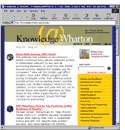Just as companies today are looking for systems to manage knowledge, so too are universities seeking ways to gather, interpret and present the enormous amounts of information generated within their organizations.
At a place like Wharton, knowledge comes from a variety of sources: research conducted by world class faculty in 11 different academic departments; the presentations of panelists at conferences and forums; analyses of business and industry trends from the school’s 19 research centers; and reports on the campus visits of CEOs and business/government/academic leaders, to name some.
To share this intellectual capital, Wharton recently launched a new online business publication called Knowledge@Wharton. The publication is aimed primarily at corporate executives, entrepreneurs, policy makers, academics, journalists and business students, although the site is free and available to anyone with Internet access. The site’s web address is http://knowledge.wharton.upenn.edu.
Knowledge@Wharton, which has been in the works for more than a year, is as unusual as it is informative. Readers can tap into a wide array of business articles, research papers, conference reports, business profiles, business commentary, news and industry analyses and book reviews. The site is updated every two weeks.
As a web-based resource, the information contained in Knowledge@Wharton is both sign-posted and layered. The home page includes short summaries of current articles, while a series of identifiable icons links these summaries to 14 different sections ranging from business/finance, health economics and strategic management to marketing, human resources, insurance/pensions and leadership/entrepreneurship.
Clicking through to the second level allows users to view longer summaries based on research papers. These articles, written by professional business writers for an executive audience, highlight managerial insights offered in the research.
Readers who desire even more in-depth information can click through to the next level to find the original papers on which the research reports are based.
Finally, Knowledge@Wharton lets readers link to other business-oriented web sites, creating in effect their own digital path into the power of the world wide web.
The test issue of Knowledge@Wharton produced last spring included the following editorial articles:
- “Can Number Crunchers Become Geeks?”
- “Should Managed Health Care Be Regulated?”
- “Lessons That Leadership Moments Teach”
- “How and When Advertising Works”
- “The Little (Search) Engines That Could”
- “The Euro Revolution”
The publication also included reports on the campus visits of Jack Welch, CEO of General Electric Co., and Warren Buffet, CEO of Berkshire Hathaway, and stock market analysis by finance professor Jeremy Siegel, author of Stocks for the Long Run. In addition, Knowledge@Wharton has begun to add abstracts and electronic copies of the 2,000 working papers archived at Wharton’s Lippincott Library. And the web site offers a wide array of links to Internet sites, divided by category.
Mukul Pandya, Knowledge@Wharton’s editor, suggests that the web site is “an excellent way for alumni to keep in touch with the school. They can, for example, access their former professors’ research, get timely information on business trends or ‘listen in’ on a visiting CEO’s talk to students. Alumni can continue to learn from Wharton no matter where they are.”


























